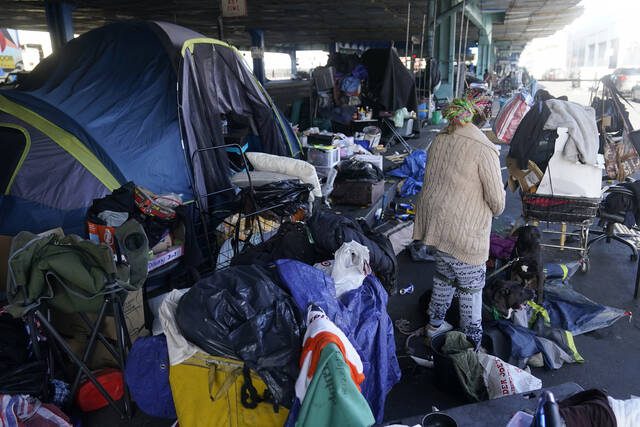In the United States, a record number of people are without a permanent place to live, and the Supreme Court will hear a very important case on homelessness that has not happened in a long time.
On Monday, the justices will review a challenge to decisions from a California-based appeals court. The court found that punishing people for sleeping outside when there is no shelter is unconstitutional cruel and unusual punishment.
A mix of officials in the West and California, where about one-third of the nation’s homeless population lives, argue that these decisions have limited them from taking “common sense” actions to prevent homeless camps from taking over public parks and sidewalks.
Advocacy groups say these decisions are important legal protections, particularly as more people are forced to sleep outdoors due to the high cost of housing.
The case at the Supreme Court comes from Grants Pass, a small city in southern Oregon. Rents are going up, and there is just one overnight shelter for adults. As more tents appear in its parks, the city banned camping and set fines of $295 for people sleeping there.
The 9th U.S. Circuit Court of Appeals mostly stopped the camping ban, saying it is not okay to punish people for sleeping outside when there is not enough shelter space. Grants Pass asked the Supreme Court to review this, saying the decision did not leave them with good choices.
Lawyer Theane Evangelis, who represents Grants Pass, said, “It really has made it impossible for cities to address growing encampments, and they’re unsafe, unhealthy and problematic for everyone, especially those who are experiencing homelessness.”
The city is also challenging a 2018 decision, known as Martin v. Boise, that first banned camping when shelter space is lacking. This decision was made by the 9th Circuit based in San Francisco and applies to nine Western states. The Supreme Court did not take up a different challenge to the ruling in 2019, before its current conservative majority was established.
Advocates say that if the decision is overturned, it would be easier for cities to deal with homelessness by arresting and fining people rather than helping them find shelter and housing.
Jesse Rabinowitz, campaign and communications director for the National Homeless Law Center, said, “In Grants Pass and across America, homelessness has grown because more and more hardworking people struggle to pay rent, not because we lack ways to punish people sleeping outside.” Local laws that forbid sleeping in public spaces have increased by at least 50% since 2006, he added.
Homelessness in the United States increased by 12%, reaching its highest reported level due to rising rents and a decrease in coronavirus pandemic assistance. According to federal data, four in 10 homeless people sleep outside.
More than 650,000 people are estimated to be homeless, the most since the country began using the yearly point-in-time survey in 2007. Advocates said that people of color, LGBTQ+ people, and seniors are affected disproportionately.
Two of four states with the nation’s largest homeless populations, Washington and California, are in the West. Officials in cities like Los Angeles and San Francisco express that they do not wish to penalize individuals simply because they are compelled to sleep outside, but that cities require the authority to control growing encampments.
“I never want to make homelessness a crime, but I want to be able to persuade people to accept services and shelter,” shared Thien Ho, the district attorney in Sacramento, California, where homelessness has increased significantly in recent years.
San Francisco indicates that it has been unable to implement camping regulations because the city does not possess adequate shelter space for its entire homeless population, something it estimates would cost $1.5 billion to provide.
“These encampments frequently block sidewalks, hinder employees from cleaning public pathways, and pose health and safety hazards for both the unhoused and the public at large,” attorneys for the city wrote. City workers have also encountered knives, drug dealing, and confrontational individuals at encampments, they said.
Several cities and Democratic California Gov. Gavin Newsom urged the high court to maintain some legal protections in place while restraining “overreach” by lower courts. The Martin v. Boise ruling allows cities to regulate and “sweep” encampments, but not enforce total bans in communities without enough beds in shelters.
The Justice Department also supported the idea that people should not be penalized for sleeping outside when they have no alternative, but stated that the Grants Pass ruling should be discarded because the 9th Circuit deviated by not defining what it means to be “involuntarily homeless.”
Evangelis, the lawyer for Grants Pass, argues that the Biden administration’s position would not resolve the problem for the Oregon city. “It would be impossible for cities to truly address the homelessness crisis,” she said.
Public encampments are not suitable places for people to reside, said Ed Johnson, who represents individuals living outside in Grants Pass as director of litigation at the Oregon Law Center. However, enforcement of camping bans often exacerbates homelessness by necessitating individuals to expend money on fines rather than housing or acquiring an arrest record that complicates obtaining an apartment. Public officials should prioritize addressing shortages of affordable housing so individuals have residences, he said.
“It’s frustrating when people who have all the power throw up their hands and say, ‘there’s nothing we can do,” he lamented. “People have to relocate.”
The Supreme Court is anticipated to make a decision by the end of June.



